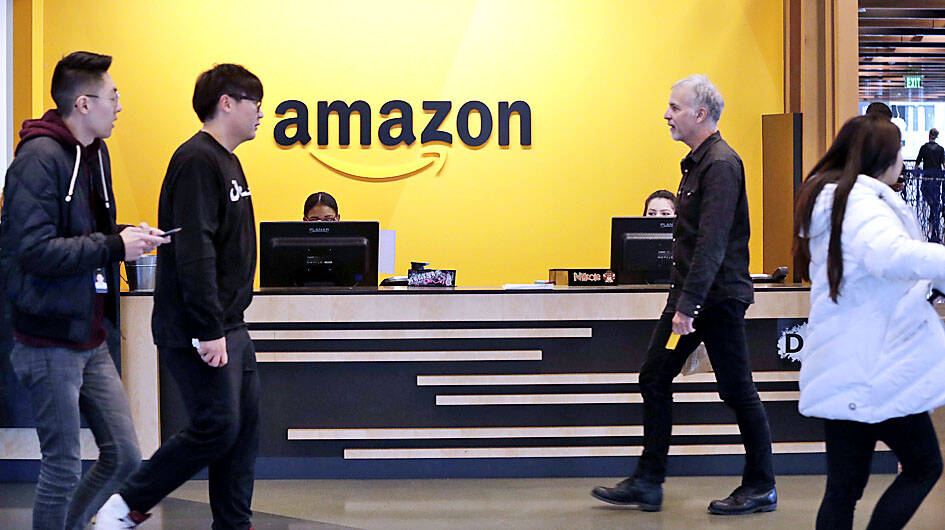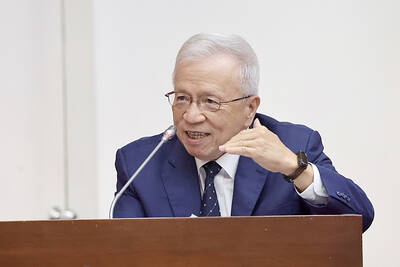A group of Amazon.com Inc workers upset about recent layoffs, a return-to-office mandate and the company’s environmental impact planned to walk out yesterday at the company’s Seattle headquarters.
The lunchtime protest came a week after Amazon’s annual shareholders’ meeting and a month after a policy took effect requiring workers to return to the office three days per week.
“We respect our employees’ rights to express their opinions,” the company said in a statement.

Photo: AP
As of Tuesday night, more than 1,800 employees had pledged to walk out around the world, with about 870 in Seattle, said Amazon Employees for Climate Justice, a climate change advocacy group founded by Amazon workers.
While some planned to gather at the Amazon Spheres — a four-story structure in downtown Seattle that from the outside looks like three connected glass orbs — others were to participate remotely.
Brad Glasser, an Amazon spokesperson, said there has been a good energy on the company’s South Lake Union campus and at its other urban centers since more employees returned to the office.
However, more than 20,000 workers signed a petition urging Amazon to reconsider the return-to-office mandate.
“As it pertains to the specific topics this group of employees is raising, we’ve explained our thinking in different forums over the past few months and will continue to do so,” Glasser said in a statement,
In a February memo, Amazon CEO Andy Jassy said the company made its decision to return corporate employees to the office at least three days a week after observing what worked during the COVID-19 pandemic.
Among other things, he said senior leadership watched how staff performed and talked to leaders at other companies.
He said they concluded employees tended to be more engaged in person and collaborate more easily.
In a note asking Amazon employees to pledge their participation in the walkout, organizers said Amazon “must return autonomy to its teams, who know their employees and customers best, to make the best decision on remote, in-person, or hybrid work, and to its employees to choose a team which enables them to work the way they work best.”
Some employees have also complained that Amazon has been slow to address its impact on climate change.
Amazon, which relies on fossil fuels to power the planes, trucks and vans that ship packages all over the world, has an enormous carbon footprint. Amazon workers have been vocal in criticizing some of the company’s practices.
In an annual statement to investors, Amazon said it aims to deploy 100,000 electric delivery vehicles by 2030 and reach net zero carbon by 2040. However, walkout organizers contend the company must do more and commit to zero emissions by 2030.
The walkout follows widespread cost-cutting at Amazon, where layoffs have affected workers in advertising, human resources, gaming, stores, devices and Amazon Web Services, the company’s cloud computing division. The company has cut 27,000 jobs since November last year.
Amid growing anxiety over the potential for a recession, Amazon in the past few months shut down a subsidiary that has been selling fabrics for nearly 30 years; shuttered Amazon Care, its hybrid virtual, in-home care service; and closed Amazon Smile, a philanthropic program.

JITTERS: Nexperia has a 20 percent market share for chips powering simpler features such as window controls, and changing supply chains could take years European carmakers are looking into ways to scratch components made with parts from China, spooked by deepening geopolitical spats playing out through chipmaker Nexperia BV and Beijing’s export controls on rare earths. To protect operations from trade ructions, several automakers are pushing major suppliers to find permanent alternatives to Chinese semiconductors, people familiar with the matter said. The industry is considering broader changes to its supply chain to adapt to shifting geopolitics, Europe’s main suppliers lobby CLEPA head Matthias Zink said. “We had some indications already — questions like: ‘How can you supply me without this dependency on China?’” Zink, who also

At least US$50 million for the freedom of an Emirati sheikh: That is the king’s ransom paid two weeks ago to militants linked to al-Qaeda who are pushing to topple the Malian government and impose Islamic law. Alongside a crippling fuel blockade, the Group for the Support of Islam and Muslims (JNIM) has made kidnapping wealthy foreigners for a ransom a pillar of its strategy of “economic jihad.” Its goal: Oust the junta, which has struggled to contain Mali’s decade-long insurgency since taking power following back-to-back coups in 2020 and 2021, by scaring away investors and paralyzing the west African country’s economy.

BUST FEARS: While a KMT legislator asked if an AI bubble could affect Taiwan, the DGBAS minister said the sector appears on track to continue growing The local property market has cooled down moderately following a series of credit control measures designed to contain speculation, the central bank said yesterday, while remaining tight-lipped about potential rule relaxations. Lawmakers in a meeting of the legislature’s Finance Committee voiced concerns to central bank officials that the credit control measures have adversely affected the government’s tax income and small and medium-sized property developers, with limited positive effects. Housing prices have been climbing since 2016, even when the central bank imposed its first set of control measures in 2020, Chinese Nationalist Party (KMT) Legislator Lo Ting-wei (羅廷瑋) said. “Since the second half of

AI BOOST: Next year, the cloud and networking product business is expected to remain a key revenue pillar for the company, Hon Hai chairman Young Liu said Manufacturing giant Hon Hai Precision Industry Co (鴻海精密) yesterday posted its best third-quarter profit in the company’s history, backed by strong demand for artificial intelligence (AI) servers. Net profit expanded 17 percent annually to NT$57.67 billion (US$1.86 billion) from NT$44.36 billion, the company said. On a quarterly basis, net profit soared 30 percent from NT$44.36 billion, it said. Hon Hai, which is Apple Inc’s primary iPhone assembler and makes servers powered by Nvidia Corp’s AI accelerators, said earnings per share expanded to NT$4.15 from NT$3.55 a year earlier and NT$3.19 in the second quarter. Gross margin improved to 6.35 percent,